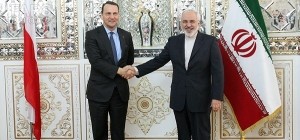 TEHRAN � The visit here of Poland�s foreign minister this past weekend came three months after Iran signed an interim nuclear deal with the international community in Geneva.
TEHRAN � The visit here of Poland�s foreign minister this past weekend came three months after Iran signed an interim nuclear deal with the international community in Geneva.�Iran is an important partner for us. We hope that Tehran will find the way to convince the world that its nuclear program serves peaceful purposes and [that] the final agreement will be signed,� said Radoslaw Sikorski after meeting his Iranian counterpart, Mohammad Javad Zarif, in this city on Saturday.
Poland is not involved in the negotiations of the P5+1 world powers with Tehran, but as a European Union member it is obliged to follow the sanctions imposed by Brussels.
�We are happy with our partnership [with Poland], but much more can be done,� said Zarif.
During their meeting, marking the first time a high-ranking Polish official has visited Iran in over a decade, the two ministers agreed to boost bilateral economic cooperation, mainly in the realms of pharmaceuticals, petrochemicals and the food industry. There are many branches of the economy which are not affected by the international sanctions, and Poland wants to take advantage of this, one diplomat explained, speaking off the record with journalists.
Detailed plans for future bilateral cooperation are not yet on the table. But the visit of the Polish foreign minister was an effort to put out feelers in advance of the trip here next month of the Polish deputy prime minister for the economy, Janusz Piechocinski, with a group of businessmen.
Foreign Minister Sikorski also came with more than 20 business leaders, but their meetings in Tehran were cancelled after cutting short their visit due to the turmoil in Ukraine.
Cooperation also exists between Poland and Iran in the academic arena. The Polish Institute of International Affairs � a Warsaw-based think tank � has signed an agreement with Iran�s Institute for Political and International Studies, which is closely connected to the Iranian government. The agreement includes exchanges of academics and other experts, and a Polish-Iranian roundtable that will be held at least once a year.
�This is the sign that barriers are breaking down between two countries and of the openness of Polish academics to dialogue with our Iranian colleagues,� Marcin Zaborowski, CEO of the Polish institute, who signed the agreement in Tehran, told Haaretz.
During the Mahmoud Ahmadinejad era, relations between Poland and Iran remained politically correct. Warsaw was not directly involved in imposing sanctions on Tehran and thus not publicly attacked by Iranian authorities. There were even attempts to organize ministerial visits both in Warsaw and Tehran, but all of them failed.
In the last two years, however, Iran has been seeking closer cooperation with Poland. In April 2012 a spokesman of the Iranian Foreign Ministry, Ramin Mehmanparast, met in Warsaw with local foreign ministry officials and journalists. Subsequently, after Hassan Rohani took office last fall, the new Iranian vice president, a scientist named Masoumeh Ebtekar, took part in the United Nations Climate Summit in Warsaw; she also met with various Polish officials.
Some Polish commentators claim that Tehran has been looking for allies within European Union to help ease international oil sanctions on Iran. To date, however, the bilateral encounters have not resulted in any changes in EU and Polish attitudes toward the Iranian nuclear program.
�They are looking for many friends. We are open but remain cautious,� said one high-ranking Polish diplomat, speaking on the condition of anonymity.
Radoslaw Sikorski�s visit on Saturday was widely publicized in the Iranian media in recent days. For one, the Polish ambassador to Tehran, Juliusz Gojlo, gave many interviews to local outlets. �Poland has always tried to serve as a bridge between Iran and the European Union,� he said in an interview with The Tehran Times.
The two ministers spoke in their meeting of the situation in Syria, and Sikorski called for members of the international community to include Iran in the peace process related to the conflict there. (The Iranian government had been invited to take part in the Geneva II conference on Syria in January, but the invitation was rescinded by UN Secretary General Ban Ki-moon after the United States objected.)
The Polish foreign minister also appealed to the Iranian government to do more to protect human rights, mentioning the rising number of executions in Iran and Internet censorship.
�In the morning, when I tried to log on to one of the main Polish newspaper�s websites, I received the information that it is blocked. It was shock for me,� said Sikorski during his Tehran press conference. A member of the Polish delegation related that when Sikorski raised this issue at the table during talks, everybody in the Iranian delegation smiled.
The Polish minister�s trip to Iran was not only about politics. Together with Polish businessmen and journalists, Sikorski visited various historical places in Isfahan. Local guides explained the history and architecture of the Sheikh Lotfollah Mosque, a UNESCO World Heritage Site, and the entourage also visited nearby Imam Square, a popular picnic site for Iranian families, as well as a local market with colorful ceramics and carpets, part of which was closed off to the public.
Strong ties between Iran and Poland in the modern era existed during World War II. Specifically, in 1942, some 120,000 Poles � soldiers from the Polish Armed Forces (aka Anders' Army) as well as civilian refugees � who were escaping the Soviet forces fled to Isfahan and other Iranian cities; many eventually died due to poor health. During his visit, Sikorski paid a special tribute to the Polish soldiers by laying a wreath in the Isfahan cemetery where they are buried.
"Our ancestors were received here with great hospitality," he said, "and we gratefully remember this fact."
By Haaretz
The Iran Project is not responsible for the content of quoted articles.










